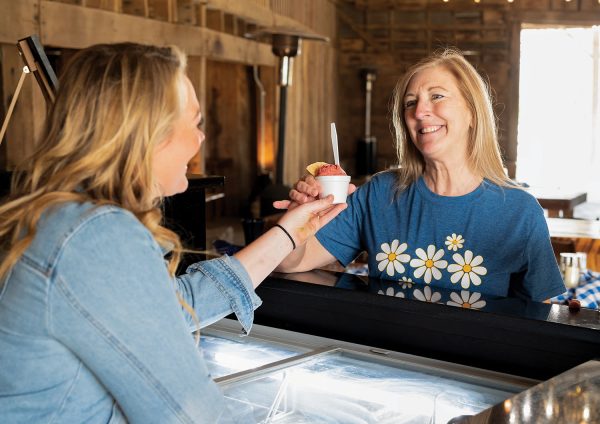A Q & A with novelist Silas House
March 22, 2017
The Capitol Arts Center in Bowling Green will host a play today created by Kentucky-based novelist/playwright, Silas House, and musician, Sam Gleaves, entitled “In These Fields.” The performance starts at 6 p.m. and will consist of monologues written by House and songs written by Gleaves.
House and Gleaves will both appear in the performance, along with actors and musicians Adanma Barton, Carla Gover, Jason Howard and Deborah Payne. Described as a “folk opera,” the play focuses on the food of the south and its effect on the region’s culture and people. House said a “folk opera” is distinguished from a traditional opera in its approach to instrumentation and emphasis on socially-conscious messages, stating, “a folk opera is more apt to use ‘folk music,’ the music of the common folk: guitars, banjos, fiddles, and the like.”
House is a best-selling author whose works include “Clay’s Quilt,” “Eli the Good” and “The Coal Tattoo.” In addition to his work with novels and plays, House is also a journalist whose work has been included in No Depression magazine and The New York Times. House is currently the NEH Chair of Appalachian Literature at Berea College.
House made time to talk to the Herald before his appearance at the Capitol Arts Center to discuss “In These Fields.”
Tell me a little bit about the origins of “In These Fields.” Where did the idea come from and what was the process like turning the idea into a stage production?
We were asked to write this play together by the Southern Foodways Alliance, a large organization that holds a conference every year and always has a closing show that focuses on a different aspect of food. Our only parameters were to write about corn. Initially we found this to be a pretty daunting assignment, but once we started to think about it, corn is such a part of everyday life for us as Southerners and Americans. The main things that came to mind for us that had to do with corn were cornbread, moonshine, but it eventually became much broader as we began to think about the way food brings us together. We ended up writing about everything from the Cherokee Removal to slavery to the way rural people are often shamed for how they eat.
The production is based on southern food. What does the food of the south say about the region’s identity, and how is its cuisine an indicator of something deeper than just a meal?
While both Sam and I have a strong connection to the raising, preparation, consumption and ceremony of food, I think writing this play made us even more aware of how much profound it is in our lives. Food is not just nourishment, it’s our culture. One of the things that binds a particular culture together more than anything else is its food ways. When immigrants move, they bring their food and music with them. And those two things are the main ingredients in this play. No pun intended.
What was it like working with Sam Gleaves? How did you start working with him, and what did he bring to the table?
Sam is one of my favorite songwriters, and I think some of his best work is on display in this folk opera. Every song is a gem. It’s always tricky to collaborate on a project with other artists–we tend to be passionate about our work–but Sam and I are so much like family that it’s easy for us to be really honest with each other without getting angry. We communicate very well, and that’s the main thing you need with a collaborator, especially on a project like this that we worked on for nearly a year. The most nerve-wracking part of the whole thing wasn’t the writing of the play but putting together a cast, aligning their schedules, etc. And we’re very lucky because our cast is so great and committed and passionate about their roles.
What advantages are there to working with a collaborator like Gleaves versus taking on more solitary pursuits, such as novels and short stories?
I think we both admire each other’s work, so we inspire each other, and we want to make each other proud, so that makes us work harder. And I really think we created something special together in this play.
Music is obviously a big part of the performance of this production, and you’ve spent time writing about music as a journalist. Does your love for southern-based music influence your other works as well? Why or why not?
Always. Anytime I write a novel I make a soundtrack of about 75 songs. Good writing should always be about emotion and no other art form captures emotion so succinctly and powerfully as music. I turn to it for inspiration throughout the writing process.
What has the reception been to the performances so far? What can an audience member take away from “In These Fields?”
Well, we got a very long standing ovation at the premier, so we breathed a big sigh of relief about that. We think that the play will make people feel a range of emotions. Our audiences always laugh, and we often see people wiping away tears. They clap along and tap their feet. But the main thing we want is for our audience to keep thinking about the themes we’ve presented long after they’ve left the theater.
Reporter Andrew Critchelow can be reached at 270-745-6288 and [email protected].



















![Megan Inman of Tennessee cries after embracing Drag performer and transgender advocate Jasmine St. James at the 9th Annual WKU Housing and Residence Life Drag Show at Knicely Conference Center on April 4, 2024. “[The community] was so warm and welcoming when I came out, if it wasn’t for the queens I wouldn’t be here,” Inman said.](https://wkuherald.com/wp-content/uploads/2024/04/smith_von_drag_3-600x419.jpg)





